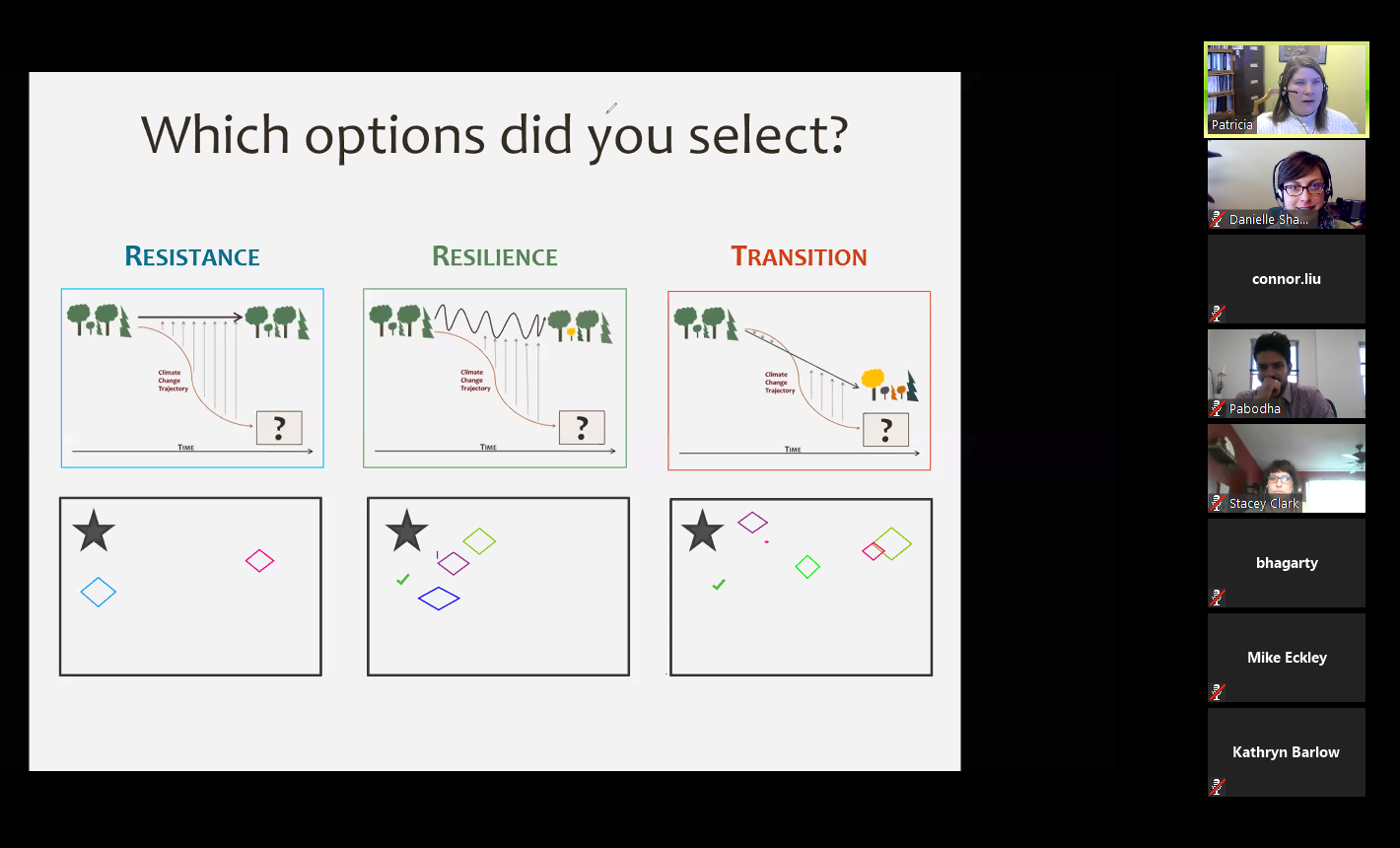The Adaptation Planning and Practices (APP) training helps natural resource managers prepare for and adapt to climate change in planning, using real-world on-the-ground projects to create custom climate adaptation plans.
The Northern Institute of Applied Climate Science (NIACS), in collaboration with the USDA Northern Forests Climate Hub, and several regional partners, now offers an online climate adaptation training using the APP training process and the Adaptation Workbook online tool.
Through this training, participants will be able to:
- Identify climate change impacts that pose the greatest challenges and opportunities for their project area or ecosystem
- Describe whether and how management may need to be adjusted in light of climate change
- Develop specific actions to help ecosystems adapt to changing conditions, and connect action plans with broader climate adaptation concepts and strategies
- Use the Adaptation Workbook to create their own “climate-informed” project plan
- Better communicate with stakeholders on key climate change vulnerabilities relevant to their region
- Access support from NIACS during project planning and implementation
Use the Adaptation Workbook to create a customized adaptation plan that reflects your values, goals, and unique adaptation responses. Browse a library of Adaptation Demonstration projects that have used the Adaptation Workbook online.
Online APP training FAQ
How does it work? 
The seven-week training draws on a combination of regular webinars and discussions with all participants, as well as independent work time. During the training, participants will develop (individually or in small groups) their own climate-informed adaptation project plan or proposal.
Those interested in enrolling should be able to commit to seven 1.5-hour web meetings. These live training sessions bring together all participants for a combination of webinar presentations to cover key concepts, and group discussions to share insights and questions related to projects. Participants are expected to attend all sessions.
In addition to the live sessions, outside assignments will guide participants through the new material and corresponding sections of the Adaptation Workbook, actively engaging them with supplementary videos, links to additional resources, and opportunities for reflection and commentary. Participants are assigned Adaptation Workbook steps to complete in the intervening days between live sessions; these assignments are generally expected to take 2-4 hours to complete. Browse real-world adaptation plans developed using the Adaptation Workbook in past trainings.
Who should participate?
This training is designed for any natural resources professionals working in forests and associated ecosystems, including foresters, natural resource managers, and consultants working on public, tribal, and private lands. Professionals providing Extension, service forestry, or technical assistance to foresters and woodland owners are also encouraged to participate. The training is designed to be effective for motivated individuals as well as small groups (max 4-5 recommended), which allows for greater discussion and generating ideas.
How much time is required?
There are seven live sessions of approximately 90 minutes each. In addition, Adaptation Workbook steps are assigned as homework for the intervening days between live sessions, and are generally expected to take 2-4 hours each. Expect to commit between 25 and 30 hours for the entire training period. The training syllabus provides an estimate of time required for each step of the Adaptation Workbook to help with time management.
What does it cost?
There is no registration fee thanks to support from the Northern Institute of Applied Climate Science, US Forest Service and the USDA Northern Forests Climate Hub and regional partnerships.
What do I get out of the training?
The online adaptation workbook and training helps users to create a custom Adaptation Plan that uniquely reflects their goals, and values. The Adaptation Workbook online tool will format project details into a comprehensive adaptation plan that can be downloaded and incorporated into existing project plans and shared with partners. Check out examples of real-world project adaptation plans that have previously used the Adaptation Workbook (links below):
Are there restrictions or requirements?
A phone line and a computer/device connected to the internet (with a web browser installed) are the only required equipment. We find that everyone gets more out of the training when all participants are working on projects in a similar region or ecosystem type, and therefore instructors often limit online training enrollment to a specific region (and sometimes topic). Enrollment is often capped at 20 projects (whether individual or group projects) per training. If you are interested in a training that is already full, or would like to see one held for your region / focus area, contact us. If you or your agency would be interested in co-hosting a training (online or in-person) for professionals in your region / focus area, we invite you to contact us as well.
Who are the instructors?
Each online APP training, like the in-person trainings, is led by a team of instructors with expertise in a focus region or topic. This team is often comprised of regional partners and led by NIACS climate change specialists, who are experienced in facilitating adaptation practices through the Climate Change Response Framework, along with key collaborators and experts.
Have more questions? Learn more about the training and whether it’s right for you.
When are trainings offered?
We host multiple trainings each year that focus on a particular region, or topic. Find a list of upcoming online and in-person events on the Climate Change Response Framework website, or contact us to request a training.
How can I learn more about this training approach?
Download the publication, "Beyond Planning Tools: Experiential Learning in Climate Adaptation Planning and Practices" to find detailed descriptions of the planning tools developed by the NIACS Climate Change Response Framework and a case study describing this approach (download here, free access).
